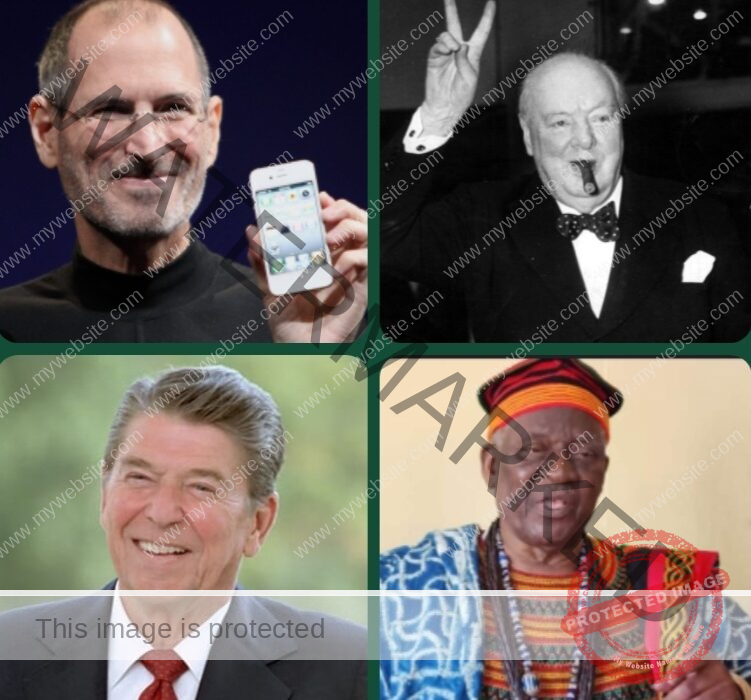Steve Jobs,Winston Churchill,Ronald Reagan,John Fru Ndi, all used disruption in course of their various journeys to success.
By The Editor-in-Chief Ali Dan Ismael.
Throughout history, meaningful change—whether in business, technology, or governance—has rarely come through consensus or comfort. It has always emerged through disruption. Disruption unsettles the status quo. It challenges entrenched systems. And in doing so, it opens the path to transformation.
The Apple Phenomenon: When Innovation Disrupted the World
In the corporate world, few stories exemplify disruption more powerfully than Apple under Steve Jobs. In the late 20th and early 21st centuries, Jobs revolutionized personal computing, music, and mobile communication. The introduction of the iPhone didn’t just change the phone—it changed how humans interact with the world.
Jobs didn’t ask for permission. He didn’t try to improve on the competition—he changed the game entirely. Apple became more than a company; it became a cultural force. Jobs rose to the pinnacle of influence and wealth, not by adapting to the rules, but by writing new ones.
Churchill and Reagan: Political Disruption that Changed the World
In politics, Winston Churchill emerged as Britain’s wartime prime minister when appeasement had failed. At a time when Hitler’s Nazi regime was marching across Europe, Churchill’s defiance stood alone. His words—”we shall never surrender”—were not diplomacy. They were disruption in pure form. Against the odds, and despite internal opposition, Churchill galvanized his people, built improbable alliances, and brought the Third Reich to its knees.
Decades later, Ronald Reagan—an actor turned politician—brought ideological clarity and strategic disruption to Cold War politics. His reforms and rhetoric destabilized the Soviet bloc. His demand to “tear down this wall” wasn’t just symbolic; it signaled a disruptive approach to global power dynamics. And it worked.
John Fru Ndi: The Local Spark that Fizzled
At home in Cameroon, the rise of John Fru Ndi in the early 1990s was a spark of hope. With his “power to the people” slogan, he injected a new vocabulary into the Cameroonian body politic. He brought the regime to the edge of panic. Crowds filled stadiums. The opposition had a face—and that face was fearless.
But Fru Ndi faltered. The message lost its edge. His victory in the 1992 presidential election was denied—and he accepted the charade. The baton of resistance was dropped. French intelligence and the subtle machinery of assimilation swallowed him. What started as a movement of disruption dissolved into a managed opposition. He believed the system could be reformed. It couldn’t. And he paid the price.
History is there to learn from. Like Fru Ndi, John Ngu Foncha before him believed that French Cameroonians could be domesticated through Anglophone civility. He believed that internal reform could lead to peaceful coexistence. He was wrong. They both were. Their vision was noble—but it was rooted in illusion.
The bitter truth every Ambazonian must now internalize is this: French Cameroonians must be left to their own devices. We cannot save them, and we must not drown with them. Our duty is to chart a separate course—and to ensure they do not drag us down in their collapse.
Dr. Sako: Disrupting with Strategy, Not Sentiment
This brings us to today—and to Dr. Samuel Ikome Sako. Unlike Fru Ndi or Foncha, Dr. Sako has never mistaken French diplomacy for sincerity or believed in the illusions of unity under tyranny. He has studied history. He knows that you do not bring civility to a battlefield. His philosophy is simple but profound: “Never go to a gunfight with a knife.”
Under his leadership, the Ambazonian cause has refused to be neutralized, co-opted, or betrayed. We have avoided every attempt by La République du Cameroun (LRC) to draw us into private backroom negotiations—because we know the danger of French-scripted political theatre.
We have rejected any initiative where LRC appoints our interlocutors or frames the terms. We are not guests at the negotiation table—we are equal stakeholders. We do not seek assimilation. We seek emancipation.
This is not just a struggle for land—it is a struggle for dignity, for truth, and for self-determination. In this new era of African awakening, we reject the idea that our destiny must be decided in the corridors of Yaoundé or the embassies of foreign powers.
Conclusion: Disruption, Not Dialogue with Dictators
True transformation is never handed over—it is seized through disruption. Apple disrupted the world and changed how we communicate. Churchill disrupted appeasement and saved a continent. Reagan disrupted a Cold War and collapsed an empire.
Dr. Sako disrupts the colonial status quo of La République. He refuses illusions, rejects co-option, and resists the temptation of elite compromise.
We represent the position of Ambazonians. We have not and shall not engage in secret negotiations with Yaoundé. We have not and shall not accept their appointed “moderators.” Our path is clear—and our resolve unshaken.
Disruption is not destruction. It is creation—of a new nation, a free Ambazonia.
Ali Dan Ismael editor-in-chief

